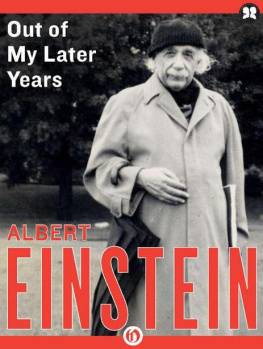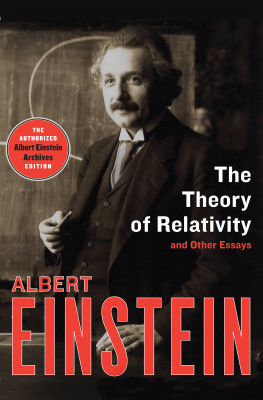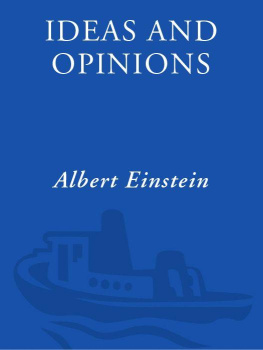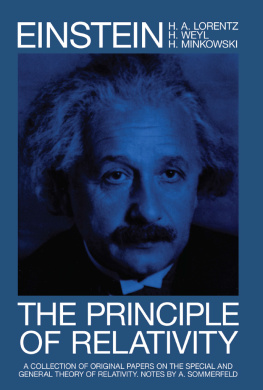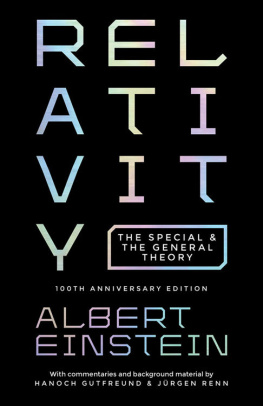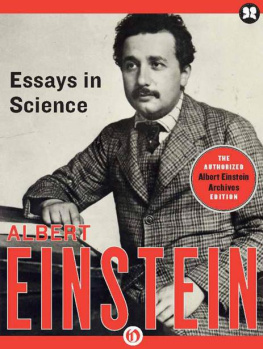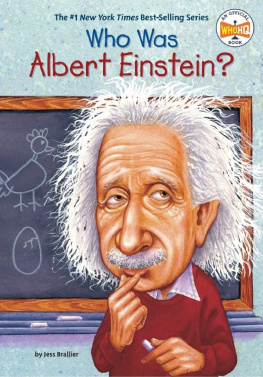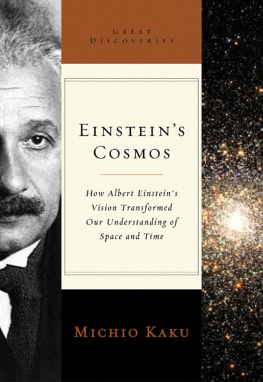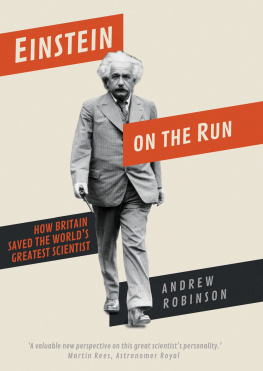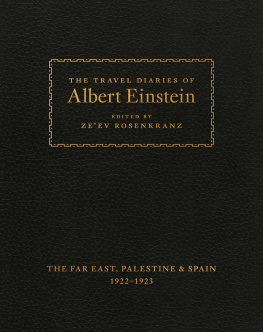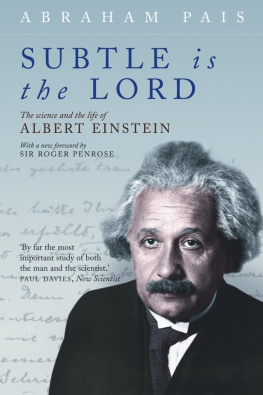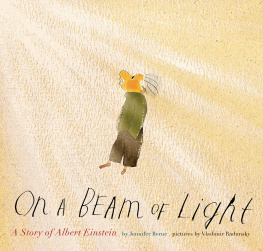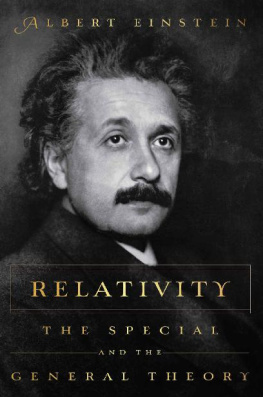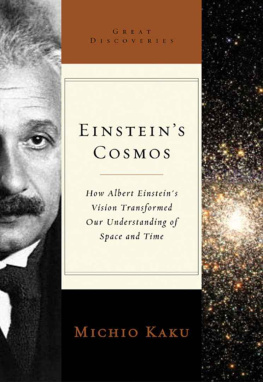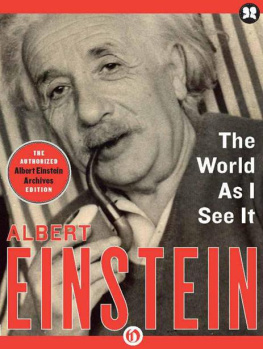Albert Einstein - Out of My Later Years: The Scientist, Philosopher, and Man Portrayed Through His Own Words
Here you can read online Albert Einstein - Out of My Later Years: The Scientist, Philosopher, and Man Portrayed Through His Own Words full text of the book (entire story) in english for free. Download pdf and epub, get meaning, cover and reviews about this ebook. year: 2011, publisher: Philosophical Library/Open Road, genre: Religion. Description of the work, (preface) as well as reviews are available. Best literature library LitArk.com created for fans of good reading and offers a wide selection of genres:
Romance novel
Science fiction
Adventure
Detective
Science
History
Home and family
Prose
Art
Politics
Computer
Non-fiction
Religion
Business
Children
Humor
Choose a favorite category and find really read worthwhile books. Enjoy immersion in the world of imagination, feel the emotions of the characters or learn something new for yourself, make an fascinating discovery.
- Book:Out of My Later Years: The Scientist, Philosopher, and Man Portrayed Through His Own Words
- Author:
- Publisher:Philosophical Library/Open Road
- Genre:
- Year:2011
- Rating:3 / 5
- Favourites:Add to favourites
- Your mark:
- 60
- 1
- 2
- 3
- 4
- 5
Out of My Later Years: The Scientist, Philosopher, and Man Portrayed Through His Own Words: summary, description and annotation
We offer to read an annotation, description, summary or preface (depends on what the author of the book "Out of My Later Years: The Scientist, Philosopher, and Man Portrayed Through His Own Words" wrote himself). If you haven't found the necessary information about the book — write in the comments, we will try to find it.
Albert Einstein: author's other books
Who wrote Out of My Later Years: The Scientist, Philosopher, and Man Portrayed Through His Own Words? Find out the surname, the name of the author of the book and a list of all author's works by series.
Out of My Later Years: The Scientist, Philosopher, and Man Portrayed Through His Own Words — read online for free the complete book (whole text) full work
Below is the text of the book, divided by pages. System saving the place of the last page read, allows you to conveniently read the book "Out of My Later Years: The Scientist, Philosopher, and Man Portrayed Through His Own Words" online for free, without having to search again every time where you left off. Put a bookmark, and you can go to the page where you finished reading at any time.
Font size:
Interval:
Bookmark:
Out of My Later Years
The Scientist, Philosopher and Man Portrayed Through His Own Words
Albert Einstein

Contents
THIS SECOND VOLUME of collected essays by Albert Einstein covers a period of about fifteen years1934 to 1950; the first anthology, published under the title The World As I See It, comprising material from 1922 to 1934.
Albert Einstein does not belong to that group of scholars who live in the ivory tower of their research work, oblivious to the world around them. On the contrary, he has always been an astute and critical observer of the trends and needs of his time. Indeed, frequently did he intervene by written as well as spoken appeal, and always, we should like to emphasize, for a humanitarian cause.
In this sense Out of My Later Years mirrors the philosophical, as well as political and social attitudes of its author. The chapters themselves represent addresses, articles, letters, appeals and miscellaneous papers hitherto unpublished.
We feel privileged to offer them to the public with hardly any editorial changea moving document of the workings of a conscientious, profound and deeply humane mind.
OF WHAT IS SIGNIFICANT in ones own existence one is hardly aware, and it certainly should not bother the other fellow. What does a fish know about the water in which he swims all his life?
The bitter and the sweet come from the outside, the hard from within, from ones own efforts. For the most part I do the thing which my own nature drives me to do. It is embarrassing to earn so much respect and love for it. Arrows of hate have been shot at me too; but they never hit me, because somehow they belonged to another world, with which I have no connection whatsoever.
I live in that solitude which is painful in youth, but delicious in the years of maturity.
READING ONCE AGAIN the lines I wrote almost ten years ago, I receive two strangely contrasting impressions. What I wrote then still seems essentially as true as ever; yet, it all seems curiously remote and strange. How can that be? Has the world changed so profoundly in ten years, or is it merely that I have grown ten years older, and my eyes see everything in a changed, dimmer light? What are ten years in the history of humanity? Must not all those forces that determine the life of man be regarded as constant compared with such a trifling interval? Is my critical reason so susceptible that the physiological change in my body during those ten years has been able to influence my concept of life so deeply? It seems clear to me that such considerations cannot throw light upon a change in the emotional approach to the general problems of life. Nor may the reasons for this curious change be sought in my own external circumstances; for I know that these have always played a subordinate part in my thoughts and emotions.
No, something quite different is involved. In these ten years confidence in the stability, yes, even the very basis for existence, of human society has largely vanished. One senses not only a threat to mans cultural heritage, but also that a lower value is placed upon all that one would like to see defended at all costs.
Conscious man, to be sure, has at all times been keenly aware that life is an adventure, that life must, forever, be wrested from death. In part the dangers were external: one might fall downstairs and break ones neck, lose ones livelihood without fault, be condemned though innocent, or ruined by calumny. Life in human society meant dangers of all sorts; but these dangers were chaotic in nature, subject to chance. Human society, as a whole, seemed stable. Measured by the ideals of taste and morals it was decidedly imperfect. But, all in all, one felt at home with it and, apart from the many kinds of accidents, comparatively safe in it One accepted its intrinsic qualities as a matter of course, as the air one breathed. Even standards of virtue, aspiration, and practical truth were taken for granted as an inviolable heritage, common to all civilized humanity.
To be sure, the first World War had already shaken this feeling of security. The sanctity of life vanished and the individual was no longer able to do as he pleased and to go where he liked. The lie was raised to the dignity of a political instrument. The war was, however, widely regarded as an external event, hardly or not at all as the result of mans conscious planful action. It was thought of as an interruption of mans normal life from the outside, universally considered unfortunate and evil. The feeling of security in regard to human aims and values remained, for the main part, unshaken.
The subsequent development is sharply marked by political events that are not as far-reaching as the less easily grasped socio-psychological background. First a brief, promising step forward characterized by the creation of the League of Nations through the grandiose initiative of Wilson, and the establishment of a system of collective security among the nations. Then the formation of Fascist states, attended by a series of broken pacts and undisguised acts of violence against humanity and against weaker nations. The system of collective security collapsed like a house of cardsa collapse the consequences of which cannot be measured even today. It was a manifestation of weakness of character and lack of responsibility on the part of the leaders in the affected countries, and of shortsighted selfishness in the democraciesthose that still remain outwardly intactwhich prevented any vigorous counterattack.
Things grew even worse than a pessimist of the deepest dye would have dared prophesy. In Europe to the east of the Rhine free exercise of the intellect exists no longer, the population is terrorized by gangsters who have seized power, and youth is poisoned by systematic lies. The pseudo-success of political adventurers has dazzled the rest of the world; it becomes apparent everywhere that this generation lacks the strength and force which enabled previous generations to win, in painful struggle and at great sacrifice, the political and individual freedom of man.
Awareness of this state of affairs overshadows every hour of my present existence, while ten years ago it did not yet occupy my thoughts. It is this that I feel so strongly in rereading the words written in the past.
And yet I know that, all in all, man changes but little, even though prevailing notions make him appear in a very different light at different times, and even though current trends like the present bring him unimaginable sorrow. Nothing of all that will remain but a few pitiful pages in the history books, briefly picturing to the youth of future generations the follies of its ancestors.
To the volume Living Philosophy.
ALL RELIGIONS, ARTS and sciences are branches of the same tree. All these aspirations are directed toward ennobling mans life, lifting it from the sphere of mere physical existence and leading the individual toward freedom. It is no mere chance that our older universities have developed from clerical schools. Both churches and universitiesinsofar as they live up to their true functionserve the ennoblement of the individual. They seek to fulfill this great task by spreading moral and cultural understanding, renouncing the use of brute force.
The essential unity of ecclesiastical and secular cultural institutions was lost during the 19th century, to the point of senseless hostility. Yet there never was any doubt as to the striving for culture. No one doubted the sacredness of the goal. It was the approach that was disputed.
The political and economic conflicts and complexities of the last few decades have brought before our eyes dangers which even the darkest pessimists of the last century did not dream of. The injunctions of the Bible concerning human conduct were then accepted by believer and infidel alike as self-evident demands for individuals and society. No one would have been taken seriously who failed to acknowledge the quest for objective truth and knowledge as mans highest and eternal aim.
Next pageFont size:
Interval:
Bookmark:
Similar books «Out of My Later Years: The Scientist, Philosopher, and Man Portrayed Through His Own Words»
Look at similar books to Out of My Later Years: The Scientist, Philosopher, and Man Portrayed Through His Own Words. We have selected literature similar in name and meaning in the hope of providing readers with more options to find new, interesting, not yet read works.
Discussion, reviews of the book Out of My Later Years: The Scientist, Philosopher, and Man Portrayed Through His Own Words and just readers' own opinions. Leave your comments, write what you think about the work, its meaning or the main characters. Specify what exactly you liked and what you didn't like, and why you think so.

